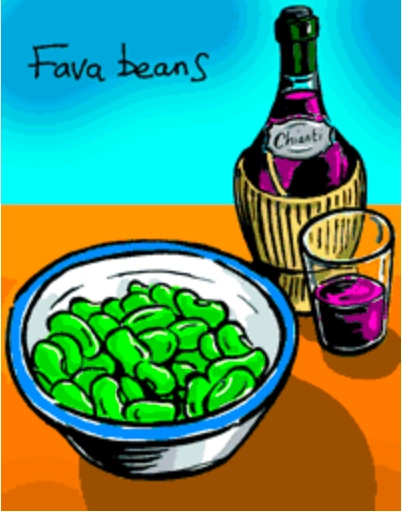It remained an important part of the diet throughout the Middle Ages, being able to be dried for storage over long periods, until it was superseded by the potato in the 16th century. Nutritionally, it is a good source of vitamins A and C, as well as potassium and iron.

The bean has given its name to favism, a genetic condition that has been described since antiquity. It has been suggested that the Pythagorean ban on consuming beans could be a result of the effects of favism on certain individuals.
It is caused by a deficiency of the enzyme glucose-6-phosphate dehydrogenase, and worldwide affects 400 million people, mainly of Mediterranean, African and Middle Eastern descent.
On contact with broad bean products, susceptible individuals suffer a severe reaction, resulting in haemolytic anaemia. Some individuals are so sensitive that even inhaling broad bean pollen can elicit a reaction, the mechanism of which is still not well understood.
However, broad beans also bring benefits. Lectins are proteins found in many plant foods, and research has shown that those from broad beans may alter the behaviour of cancer cells in the colon. They attach to carbohydrate molecules before being absorbed into the cells lining the colon during digestion.
They appear to be able to modify the behaviour of cancerous cells, halting the disease process, as well as inhibiting the multiplication of these cells.
In 1913, Guggenheim identified the anti-Parkinsonian agent levodopa in the seedlings, pods and beans of broad beans, and observations of the effect of broad beans fed to Parkinson’s disease sufferers suggest that they do lead to a significant improvement in symptoms.
Whereas the maximum dose of synthetic levodopa is limited by the incidence of drug-induced dyskinesia, some studies have suggested that the dose from broad beans can be increased with fewer side effects, and the duration of action of the drug seems to be prolonged. The mechanism for these observations is not known, but it has been suggested that amino acids contained within the beans may favour active transport across the blood-brain barrier.


